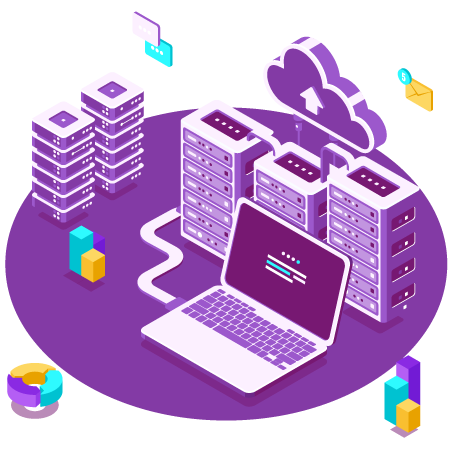
May 11, 2025
The short forms dbms and rdbms stand for Database Management System and Relational DataBase Management system. DBMS and RDBMS provide the services like computerized data storing systems, security on the data, logging, access to auditing activities, data abstraction, and independence, etc. These services are helping the companies to maintain the data in a secured and organized way and this is the major reason why database management system (DBMS) and relational database management system (RDBMS) software is needed. So let’s see separately what DBMS and RDBMS means and what are the differences between them?
A relational database management system (RDBMS) states its properties in the name itself, which means it stores data in the tables that are related to each other. This is the most common software that is being used in IT companies nowadays because it has the capability of handling a huge and multitude of data and working with complex-to-complex queries. This is usually considered as the powerhouse of Data.
.png)
The benefits of having a relational database management system are mentioned below:
RDBMS allows the database admin to easily control, maintain and update the data. The RDBMS is truly a comfortable approach for the maintenance of data.
The RDBMS uses the concept of primary key and foreign key which reduces the chances of repetitive data which helps in getting more accurate data.
Relational database management system gives ease to data analysts to insert, delete and update the tables and columns according to the business wants. There is absolutely no limit in the number of rows, columns, tables in RDBMS, and this is what it gives more flexibility in.
The relational database management system is the most secured data service ever and is being trusted by the tech giants too. System of segregation is being followed in this and when any data analyst tries to login with the id and password, he/she will only be able to access allowed tables and Data, not even a single thing above that.
The process of normalization is only possible in RDBMS over DBMS. Anyone can normalize the tables in this so that they can follow a proper structure of rows and columns.
With RDBMS services it also provides the functionality of cloud, document store, pdf storage, and more.
it provides both database management and analytics capabilities for the transactional and warehouse workloads.
This is considered the RDBMS best for mobile phones; it does include a few computer systems too. it implements a small, fast and self-contained database system.
This database is open-source and free and the most popular one.
The most popular name in the world like Google, wordpress.com, and Wikipedia is using this open-source to manage its database.

Database management system software functions as the interference between the data and end-users, it helps in organizing and managing the data, manipulation of data, and a database engine. In simple words, it is a computerized data management system but not as advanced as RDBMS. The data is structured in a hierarchical way and it can only manage one user at one time. Also, the capability of storage is very huge in DBMS so it is suitable for very small firms and companies. There are four kinds of DBMS including the RDBMS (intro is above) the remaining three are:-
The organized and maintained data combined with the technology helps the end-users to come up with quick and effective ideas, which helps in making workable decisions.
Due to the lack of boundaries the DBMS allows all the users to have access to the same data in the database. That means consistent data for all.
This is the biggest advantage if you want to share the data with your remote workers simultaneously. Yes, data can be shared with DBMS but it can only be done with the proper authorization.
The DBMS never compromised on data security. A legal id and password are needed to access the database.
this has been playing a vital role for small companies. With over hundreds of integrations, this is the best DBMS in 2021.
with this DBMS and RDBMS the user can access some of the best databases in the world such as Oracle, MySQL, and Microsoft SQL databases.
this DBMS supports more than 20 programming languages.
In DBMS, the data is stored in the form of files whereas in RDBMS the data is stored in the tabular format.
DBMS allows only a single user and RDBMS supports multiple users.
normalization is not present in DBMS but yes present in RDBMS.
DBMS is only able to store small data thus it is best for small companies, on the other hand, RDBMS supports huge files easily which is why big companies opt for RDBMS over DBMS.
DBMS does not provide any security system regarding data manipulation but RDBMS provides the most advanced security system where data manipulation is almost impossible. Because RDBMS has authority and a restriction system.
DBMS stores data in the form of a hierarchical system or navigational systems whereas RDBMS stores the data in the tabular structure with column names selected by headers and rows containing column values.
DBMS does not support the database distribution but RDBMS does support it.
data redundancy is common in the DBMS, but it is not in the RDBMS.
DBMS's best example is XML and RDBMS examples are a lot like oracle, razor SQL, MySQL, Amazon Aurora, etc.
As we can see that RDBMS is the advanced or an extension of DBMS.
If you as an owner of the business are not aware of the no of transactions, sales, purchases, cost, and all the other data then sorry to say but your business is not going to be successful in the long run. A complete and organized data helps in tracking the business activities.
Future planning for business can only be possible while referring to the data of the company. DBMS and RDBMS services keep helping to store the full data which can be used for planning purposes.
Almost every business has some kind of sensitive data that needs to be kept private. If this kind of information falls into the wrong hands, then it can be harmful to the business and business employees so the DBMS and RDBMS services keep the data private and secured which can only be accessed through proper authority.
A good RDBMS allows the analysts to update new information, analyze the making changes in the existing one, and delete something not needed anymore.
Database management system (DBMS) and relational database management system (RDBMS) services can help businesses and companies in numerous ways but they can only be useful when managed and handled by experienced data analysts. Our team and experts at xweb builders will help you in giving these DBMS and RDBMS services effectively and efficiently.